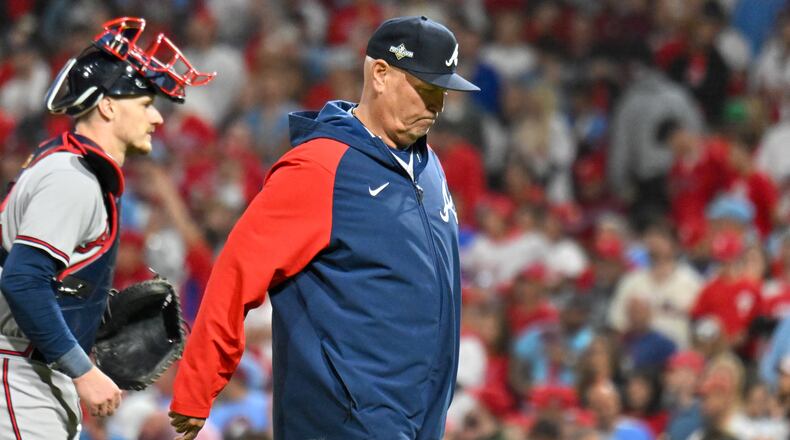Over 162 games, the Braves led MLB in runs, first-inning runs and home runs. Over four playoff games in the National League Division Series, their earliest run came in the third. They were outscored 20-8, out-homered 11-3. They didn’t score over the first 14 innings. They scored three runs over the final 18 innings. Their biggest lead was one run. They led for a total of four Philadelphia outs, two of those coming on the 8-5-3 double play that ended Game 2.
They lost the series 3-1. They were lucky they weren’t swept.
They were outpitched, outhit, out-thought. The Phillies’ plan worked, though even the Phillies didn’t expect Ranger Suarez to start Games 1 and 4 against Spencer Strider and exit both times with a lead. Strider yielded four earned runs over 12-2/3 innings. The Braves scored one run in support.
A year ago, the Phillies beat the Braves, whom they’d finished 14 games behind, by winning Games 1, 3 and 4 of the NLDS. The same thing happened, only this felt much worse. This time around, a loaded team somehow got caught short.
A year ago, the Braves’ playoff starters were World Series clincher Max Fried, 21-game-winner Kyle Wright, rookie-of-the-year runner-up Strider and playoff stalwart Charlie Morton. Afterward, the Braves claimed some of those were road-weary, but still: Those were four quality starters.
This October saw Fried, coming off 18 days of blister rehab, need 95 pitches to work four innings. It saw Brian Snitker wait until the morning of Game 3 to announce a starter. With Morton injured, the playoff rotation was essentially Strider and, uh, Strider. (Spahn and Sain aged out a while ago.)
After the Braves’ Game 2 escape, the third inning of Game 3 turned the series back toward the Phillies. Bryce Elder opened with two clean innings. Staked to a one-run lead, he didn’t make it through the third. The Phillies scored four times. Game 3 was gone, the series to follow.
At midseason, the 2023 Braves were a great team. They never stopped being a great-hitting team – not until the NLDS – but the pitching frayed. Their starters’ ERA before the All-Star break was 3.77; after the ASG, to which the Braves dispatched Strider and Elder, it was 5.10.
In September, Braves general manager Alex Anthopoulos said of the postseason: “At the end of the day, you have to pitch.” The Phillies pitched. They halted an irresistible offense. In the series, the Braves batted .185 with an OPS of .519. Over the regular season, their slugging percentage alone was .501.
The Phillies knew they entered the NLDS with the better bullpen. Even with Suarez taking two turns, they wound up the better starting pitching, too. Their starters’ ERA was 2.18 to the Braves’ 6.05. Yes, four games constitute the tiniest of sample sizes, but that’s how this works.
We wondered what would happen in postseason if the Braves didn’t pitch well. (We saw.) We couldn’t imagine this team not hitting. But, as finely balanced as this lineup seemed, everything began with Ronald Acuña Jr. After a season of historic proportions, he went 0-for-4 leading off four playoff games. All told, he was 2-for-14 with one extra-base hit.
Matt Olson, who set Braves records for homers and RBIs, was 4-for-16 with no RBIs. He had six homers and 15 RBIs in 13 regular-season games against the Phillies,the Braves winning eight. Acuña batted .339 with four homers, 10 RBIs and seven steals. Come October, the Braves mustered five hits in Games 1 and 4, four in Game 2.
Whose fault was it? Snitker’s, for changing the batting order for Game 1? Snitker’s, for not picking AJ Smith-Shawver to start Game 3? Acuña’s, for not working Acuña-like wonders? Strider’s, for not leaving either start with his team ahead, or even tied? Fried’s, for getting a blister? Anthopoulos’, for not finding another starting pitcher? Everybody’s?
Snitker didn’t have a great series. It’s impossible to have a great series when your team doesn’t pitch and doesn’t hit. That said, the Phillies were primed for the moment in a way the Braves weren’t.
Maybe the outcome would have been different had Acuña opened Game 1 with a home run off Suarez, but the simple act of taking a lead against Strider in Truist Park set Philly on a path it could negotiate. And here again we Atlantans sit, unsure how to feel about a splendid season that reached a sudden end.
The regular season was the most entertaining this city has seen. Even if this isn’t a flop the order of the 1996 World Series or the wasted 3-1 lead against L.A. in 2020, it will sting for a while. A team that appeared capable of doing anything wound up doing the same old thing – losing in October.
The above is part of a regular exercise available to all who register on AJC.com for our free Sports Daily newsletter. The full Buzz, which includes extras like a weekly poll and pithy quotes, arrives via email around 1:30 p.m. on Monday, Wednesday and Friday.
Go to the AJC.com home page. Click on “Choose from a variety of newsletters” at the top. Click on “Sports Daily.” You’ll need to enter your email address. Thanks, folks.
About the Author
The Latest
Featured



